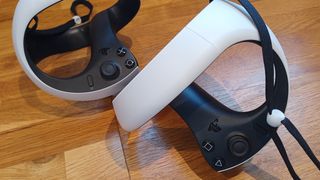
Jump to the quick list↴
1. Best overall: Quest 3
2. Best for games: PSVR 2
3. Best value: Pico 4
4. Best for PC: Valve Index
5. Best cheap: Quest 2
6. Best cheap wired: HP Reverb G2
7. Best for comfort: Quest Pro
8. Best hi-res: HTC Vive Pro 2
How to choose
How we review
FAQs
Choosing from the best VR headsets around at the moment is getting harder. As technology advances and gets cheaper, it can be hard to decide which VR headset is right for you. My guide will cover the latest trends in VR tech, and highlight which are the best VR headsets for PC as well as those VR headsets for games.
Virtual reality use is on the rise, and it's no longer just for gaming. There are some good art and design apps for VR, as well as experiences and game development uses (Unreal Engine 5 now has a dedicated VR workflow). You'll want to decide if you need a wired or wireless VR headset - this depends on your gaming needs and PC setup - as well as budget; you can get a good VR headset for as little as £349 (the Pico 4) in the UK, for example. There are also headsets that promote VR and AR, such as the new HTC VIVE XR Elite (currently not on my list as I've yet to personally try it).
One easy choice for gamers is, if you have a PS5 you really only need a PSVR 2 (something I personally use regularly). Read our guide to the best PSVR 2 games out now and coming soon for what you can play on Sony's headset. Read my interview with the Synapse art director for how VR games are made. If you're just entering the world of VR, you may like our rundown of the best VR apps.
The best VR headsets: Quick List
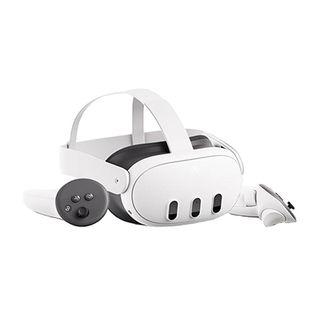
Meta Quest 3 is the latest headset aimed at a mass audience, and features great tech, a large games library and good design. It's a mobile wireless headset offering great value.
Read more below
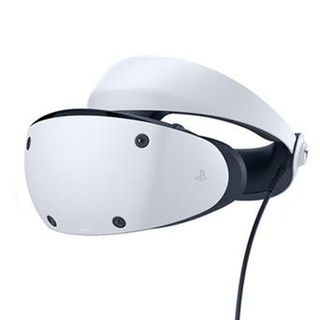
Sony's PSVR 2 has some of the best VR tech around, including full haptics, inside-out tracking and eye-tracking. It connects to PS5 to deliver powerful, exclusive games.
Read more below
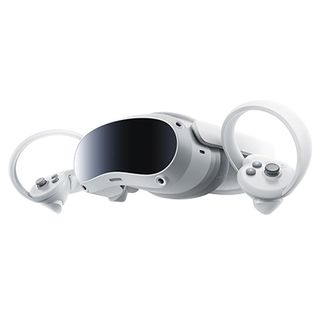
The Pico 4 is the closest competitor to Quest 3, and sits slightly behind it in terms of tech and performance but this is represented in the price, which is lower than Quest 3. The only downside is US consumers pay more.
Read more below
The best VR headsets
Why you can trust Creative Bloq
The best VR headset overall
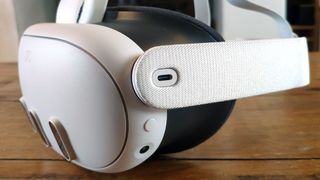
Specifications
Reasons to buy
Reasons to avoid
Meta Quest 3 builds on the tech and accessibility of the Meta Quest 2, delivering power in an easy-to-use headset; it's easily the best virtual reality headset overall. This new VR headset features colour pass-through cameras, higher resolution displays and a faster processor. And it’s more affordable than most VR headsets on my list.
While it may be more than $200 / £200 more than the previous Meta Quest 2, the tech is a step above. In our Meta Quest 3 review, Dan Oliver write, "Meta Quest 3 delivers on almost every front". The new pass-through technology means this is a genuine AR and VR headset. Unlike the PSVR 2, the Meta Quest 3 is a wireless headset that still delivers sharp and immersive experiences.
The downsides? The Quest 3 lacks eye-tracking, which is becoming a much-needed VR technology, and being wireless has reduced the graphics quality slightly and unlike PSVR 2 it features LCD instead of OLED displays. However, on balance, for price, its huge games library and advanced tech, Meta Quest 3 is the best all-round VR headset I'd recommend.
The best VR headset for games
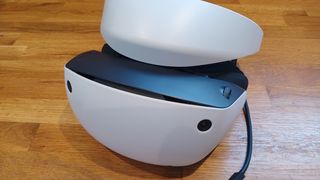
Specifications
Reasons to buy
Reasons to avoid
On paper PlayStation VR2 is, perhaps, the best VR headset on my list but it comes in second to the new Meta Quest 3 because its, well… very expensive. Both headsets have great tech, but PSVR 2 pips ahead slightly in some areas and falls behind in others. PSVR 2 is the best gaming VR headset.
For example, it has a similar resolution to Quest 3 but PSVR 2's OLED displays deliver deeper blacks and richer colours over Quest 3's LCDs. PSVR 2 also features incredible eye-tracking and motion-controls that really bring to life games like C-Smash VRS. In my PSVR 2 review I loved the eye-tracking tech, something not all virtual reality headsets have, especially for new and unique experiences, like in Before Your Eyes.
Of course, PSVR 2's major strength is it connects to the powerful PlayStation 5 console for some seriously immersive, graphics-intensive games. More so, PSVR 2 has its share of good exclusive games, like Horizon: Call of the Mountain. This strength also means PSVR 2 can be expensive. While the headset has come down in price slightly, but is still $200 / £200 more than Quest 3, you'll need a PS5 to use it; this pushes a package price to around $1,200 / £1,100.
The best value VR headset
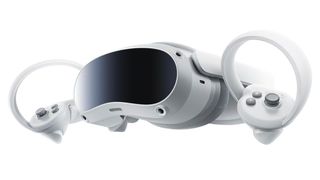
03. Pico 4
Our expert review:
Specifications
Reasons to buy
Reasons to avoid
Pico 4 is a VR headset you may not have heard of or taken notice of, it's hard to find in the US, for example, but this Chinese brand is quietly disrupting the VR headset market and catching up with Quest 3.
The tech is good, if not amazing, for example it uses Pancake lenses rather than LCD or OLED that deliver a good VR experience but lacks the field of vision of Quest 3 and PSVR 2, yet still manages 2,160 pixel resolution per eye. Pico 4 is essentially a step above Quest 2 (less chromatic aberration and ghosting issues) in all areas but slightly behind Quest 3.
Being a PC VR headset it can either be used wirelessly like Quest 3 for lower-specced games and fitness apps, or link it up and play high-spec PC VR games like Half-Life: Alyx, which we found laggy. But with graphically intensive games Pico 4's 6DoF tracking is great and performs well.
The real advantage of Pico 4 is it delivers a solid VR experience, wireless and wired, for around $649 / £380, a bundle deal with games and apps is only $778 / £420, and there are regular deals on both. As you can see from these prices, while the UK and EU get Pico 4 for less than Quest 3, in the US its more, so Meta's headset is preferred.
The best PC VR headset
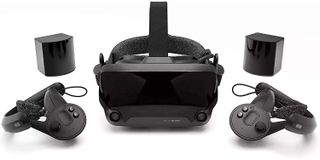
04. Valve Index
Our expert review:
Specifications
Reasons to buy
Reasons to avoid
The Valve Index remains one of the best VR headsets that money can buy, but you will need a lot of money. You'll also need a high-end PC to use this VR headset. The field of view and refresh rate even rival some of the more expensive hardware on the market, and better than PSVR 2 and Quest 3.
Games look phenomenal on the high-resolution display and the Index's 'knuckle' controllers provide an excellent level of interactivity. In fact, those that haven't grown accustomed to the usual VR controllers may find these a more natural fit.
While a high-end PC is suggested, Valve's tech can be used on older GPUs; but you will be restricting yourself as newer PC VR games will, as you'd expect, demand more power. Being a PC gaming headset also means its not as plug-and-play as PSVR 2 and Quest 3, and you will need to get through its complex setup; you need a number of cables and two cameras to get the Valve Index working properly.
The catch? Well, such power doesn't come cheap - expect to pay around $999 / £919 (and you may need to upgrade your PC gaming laptop or desktop. However, this is an excellent VR kit for those using it at home and looking for high-end hardware, and a step above both HTC Vive and the HTC Vive Pro.
The best cheap VR headset
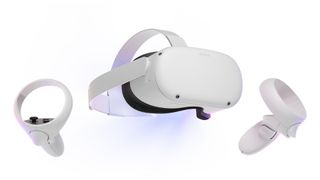
05. Meta Quest 2
Our expert review:
Specifications
Reasons to buy
Reasons to avoid
The Quest 2 changed the VR market when it launched, and thanks to everyone being stuck in Covid lockdowns millions jumped aboard (though it was called Oculus). It offers a sharp display and a decent amount of RAM. Quest 2 also is also light and made for wireless gaming.
Then there's the price. Being an older model and surpassed by Quest 3 and even the Pico 4, you can pick up a Quest 2 for under $300 / £300 for the 128GB model. For $50 / £50 more you can get the larger 256GB model, which for the money is my preferred build.
It may be older tech but it was good for the time (2020) and even surpassed many other headsets, its controller performance and design in particular was ahead of its time. Buying a Quest 2 means many newer games will be beyond the headset, but this has a large library of excellent titles that remain some of the best around; for the money Quest 2 remains a decent buy.
The best cheap wired VR headset
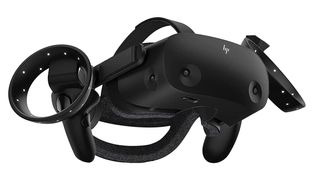
06. HP Reverb G2
Our expert review:
Specifications
Reasons to buy
Reasons to avoid
If you're looking for an affordable wired VR headset, then the HP Reverb G2 is one of the best around. Its high-resolution display delivers on the quality you want from a wired PC headset, but at a fraction of the price of the pro level Valve Index or HTC Vive Pro 2. I think this is the best cheap VR headset for PC if you want a wired device.
Unlike other PC VR headsets designed for high-end gaming, the HP Reverb G2 is easy to set up and works out of the box; it also avoids the 'screen door' effect of many PC headsets - where you can see between pixels. Unlike the Quest headsets, the HP Reverb G2 is wired, meaning you need a bunch of cables to connect to a PC, but this also guarantees a stable frame rate and limits lag (the wired versus wireless debate is a constant one for VR).
Because of the headsets excellent high resolution output you will need a very good gaming PC to run it; but because it's compatible with Steam VR out of the box you have access to some of the best VR games available. There are some issues with the motion tracking and precision, but that comes with the lower price.
Priced at $599 / £682, it's a little more expensive than Quest 3 but cheaper than the high-end PC gaming headsets HP is targeting, namely those from Valve and HTC. The exceptional resolution ensures games look incredible, too. The HP Reverb G2 is a very good budget VR headset for PC gaming.
The best VR headset for comfort
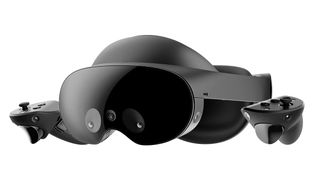
07. Meta Quest Pro
Our expert review:
Specifications
Reasons to buy
Reasons to avoid
When it comes to Meta Quest Pro, you're getting a high-spec VR headset designed for long periods of use, hardly surprising given Meta wants you to use VR for long stints on social media, VR meetings and collaborations.
When it launched last year Meta Quest Pro was an impressive, high-spec VR headset designed for comfort and able to run most VR games and apps you'd need (though it's not a wired PC headset, so something like Half Life: Alyx is a no-go). In many ways Quest Pro was a tease of what Quest 3 would be, as both headsets share similar motion and sensor tech, which means Meta's older headset is now obsolete (and Meta has wound down production).
But, Quest Pro remains a solid VR headset with a nice balance of tech versus cost, and while I can't recommend it over Quest 3, PSVR 2 or even Pico 4, this older headset has its advantages. For one, it's the most comfortable VR headset on my list, thanks to some excellent design choices that distribute weight evenly across the headset, meaning if you are intending to use this for a long period of time, it's very cosy.
Despite being superseded by Quest 3, this older Pro model is still fairly expensive, which makes it hard to fully recommend. And Quest 3's faster processor ensures a longer lifespan. If you can find one for less than $400 / £400 (hardly), I'd snap it up.
The best high-res VR headset
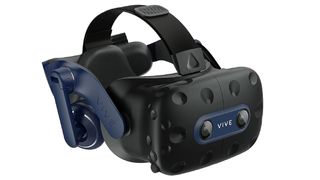
08. HTC Vive Pro 2
Our expert review:
Specifications
Reasons to buy
Reasons to avoid
The HTC Vive Pro 2 is a beast of a VR headset that delivers 5K resolution and packs in the kind of experimental tech that game developers and 3D app designers will want to fiddle with; if you want to create 3D models in VR this is the headset to go for.
But obviously this comes with some huge caveats; the headset is heavier than general consumer VR tech, has old-fashioned cables everywhere, and is prone to getting hot after extended use - but this is because its working hard to deliver that incredible resolution. You will also need a powerful PC to really get the most from this headset, which begins to add to the overall cost.
Speaking of which, the HTC Vive Pro 2 is not cheap. While you can buy the headset itself for a recommended price of $766 / £779 (though you'll find it at $200 / £200 less) making it sound not too much for the power it offers, this doesn't come with the controllers and base stations (for full-room motion scanning). The complete HTC Vive Pro 2 VR Kit will cost around $1,399 / £1,299 (though Amazon UK currently has it at £899, which is a good buy).
While the HTC Vive Pro 2 boasts a lot of power, it's also still using some older tech in certain areas, for example it relies on an outside-in tracking system (sensors around the room) rather than the newer inside-out method (cameras in the headset, used in Quest 3 and PSVR 2). The controllers, too, feel large and clumsy compared to newer headsets.
Despite this, the HTC Vive Pro 2 remains a VR headset that many gamers and devs swear by, if you have the room. The 5K resolution will impress and wipe away any other issues, particularly if you have the PC to power it properly. If you can find it cheap or discounted, HTC Vive Pro 2 is a good option.
How to choose from the best VR headsets
VR headsets have come a long way in the last five to ten years, and now you have a lot to choose from and different ways to use them. The biggest thing to note about modern VR headsets is they either come wired or wireless. For example, the Meta Quest 3 is a wireless headset that places ease of use ahead of power, while PSVR 2 connects to a PlayStation 5 to run high-end games.
Essentially, wired versus wireless is about where you choose to put the processing power, and means the headset can either be lighter and more comfortable, or the extra space can be used to cram in new tech - PSVR 2 for example has haptics built into the headset for feedback. It also means, you're not going to run Half Life: Alyx on a Quest 3, as you need the power of a high-spec PC to get it running properly.
Wireless VR headsets can also be a little more affordable, because they're making use of mobile processors, like the Meta Quest 3's Snapdragon XR2 Gen 2, which offers good performance and is economical.
Another thing to note is outside-in tracking versus inside-out tracking; the older outside-in method means placing sensors around a room to track the headsets position, while the newer inside-out approach uses cameras in the headset itself. Both are good, but the older method, used by HTC Vive Pro 2, requires more tech and space while the newer way is great for smaller rooms and mobile.
All current VR headsets offer the core features you need, such as full 6DOF (six degrees of freedom) movement tracking and touch controllers have become standard for immersion. But VR headsets can vary in speed, from 90 Hz to 200 Hz for leading-edge headsets, as well as resolution and use of haptics.
To summarise, the best VR headsets can be divided into three categories: PC headsets wired to powerful gaming PCs, mobile wireless headsets for ease and agility, and then Sony's PSVR 2, which is out on its own as the only headset for PS5, meaning it has a number of exclusive games and apps.
How we review the best VR headsets
We test and review most of the VR headsets on my list, for example I still use PSVR 2 regularly and test the latest games for it; where we're unable to review a VR headset we research them and collate reviews from around the internet, as well as internally from our sister websites TechRadar, T3 and PC Gamer.
The best VR headsets: FAQ
What is the best VR headset?
For money, tech and value, the best VR headset to buy is the Meta Quest 3. It's not the most powerful, but it is the most powerful mobile, wireless VR headset. It's also worth noting, Quest 3's specs, because of its large user base, will become a benchmark for developers.
Should I wait to buy a VR headset?
Not really, now is a great time, depending on what you need. The PSVR 2 headset for PS5 is coming down in price, while Meta Quest 3 is going to be the affordable headset for a couple of years. The only caveat is if you want a high-end VR headset for development and 3D design, in which case you may want to wait for Apple Vision Pro, releasing in 2024.
What's the best wiresless VR headset?
At the moment, the Meta Quest 3 is the best wireless VR headset you can buy, though I would say the new Pico 4 is a good value competitor if you're outside the US. If you want a little more power, then the new HTC VIVE XR Elite released this year is a good choice, as it comes close to offering a perfect mix of VR and AR (but you may want to wait for Apple Vision Pro), but is twice the price of Quest 3 and three times the cost of Pico 4.
Whatb spec PC do I need for VR?
This all depends on the VR headset you have, but a good benchmark is a newer PC with at least Intel Core i5 and i7 series, as well as the AMD Ryzen series, with at least 8GB RAM, but if you're gaming then this is likely already in your laptop or PC.
What's the difference between VR and AR?
Basically, VR is virtual reality, where you play inside a completely enclosed virtual world, while AR is augmented reality, where the real world and the game world are mixed together using a headset's cameras for pass-through. To make this work properly you need full colour pass-through of headsets like Meta Quest 3 and HTC Vive Elite. Finally, there is XR, or extended reality, that combines physical spaces with AR, motion tracking and CG, used in film production via Unreal Engine 5 LED Volume stages.
Get the Creative Bloq Newsletter
Daily design news, reviews, how-tos and more, as picked by the editors.
Ian Dean is Editor, Digital Arts & 3D at Creative Bloq, and the former editor of many leading magazines. These titles included ImagineFX, 3D World and video game titles Play and Official PlayStation Magazine. Ian launched Xbox magazine X360 and edited PlayStation World. For Creative Bloq, Ian combines his experiences to bring the latest news on digital art, VFX and video games and tech, and in his spare time he doodles in Procreate, ArtRage, and Rebelle while finding time to play Xbox and PS5.
Related articles
-
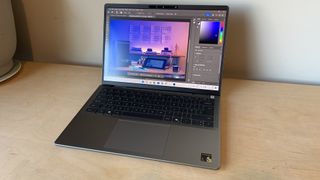
-

-

-

